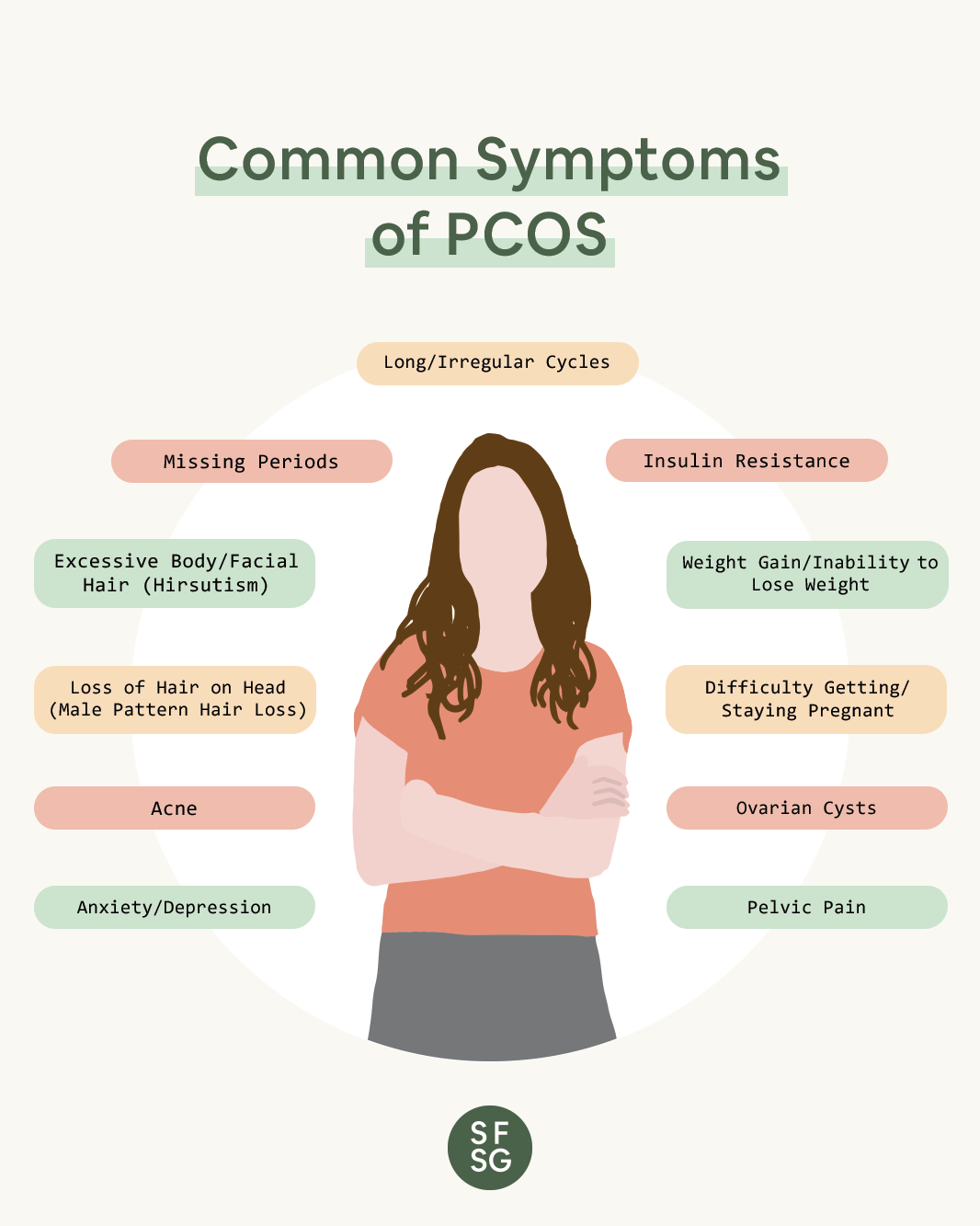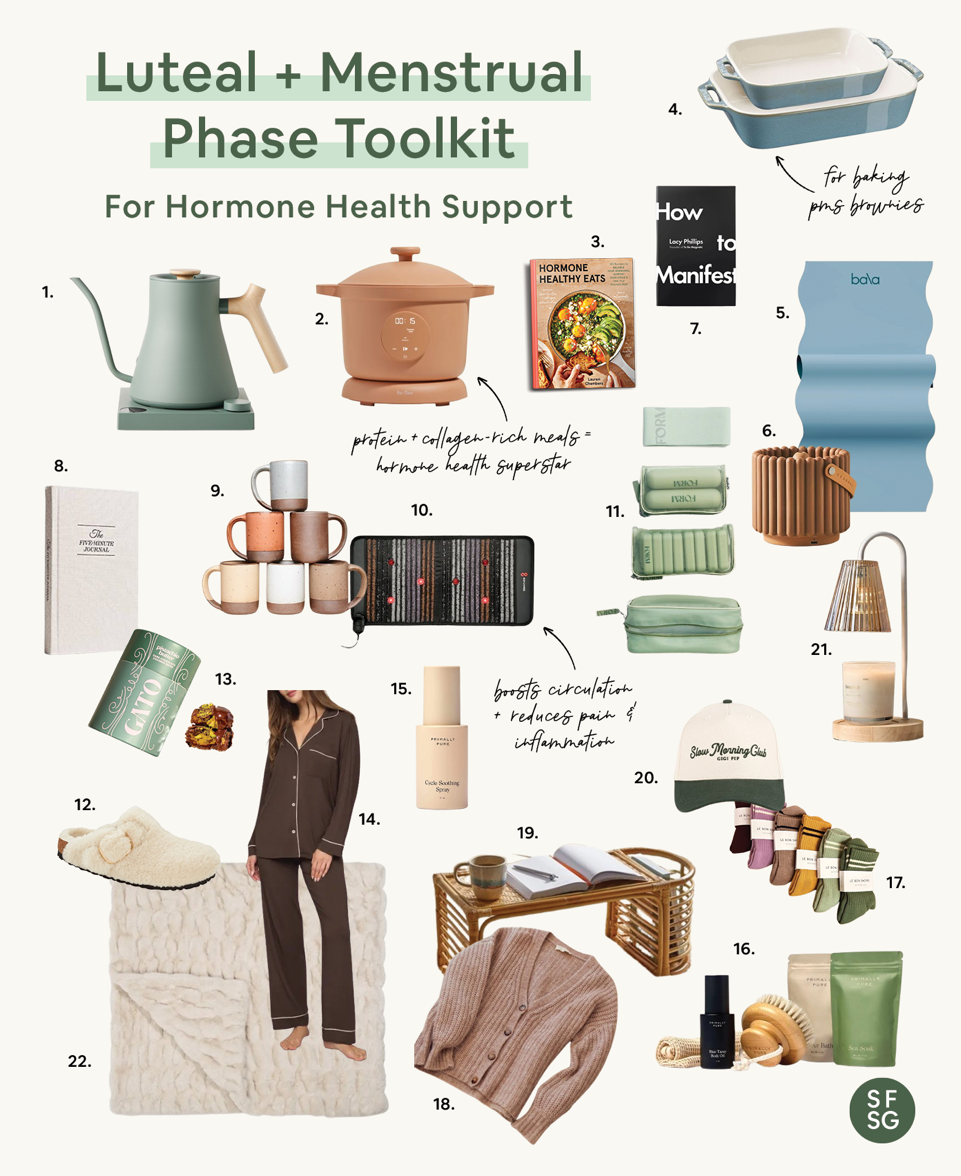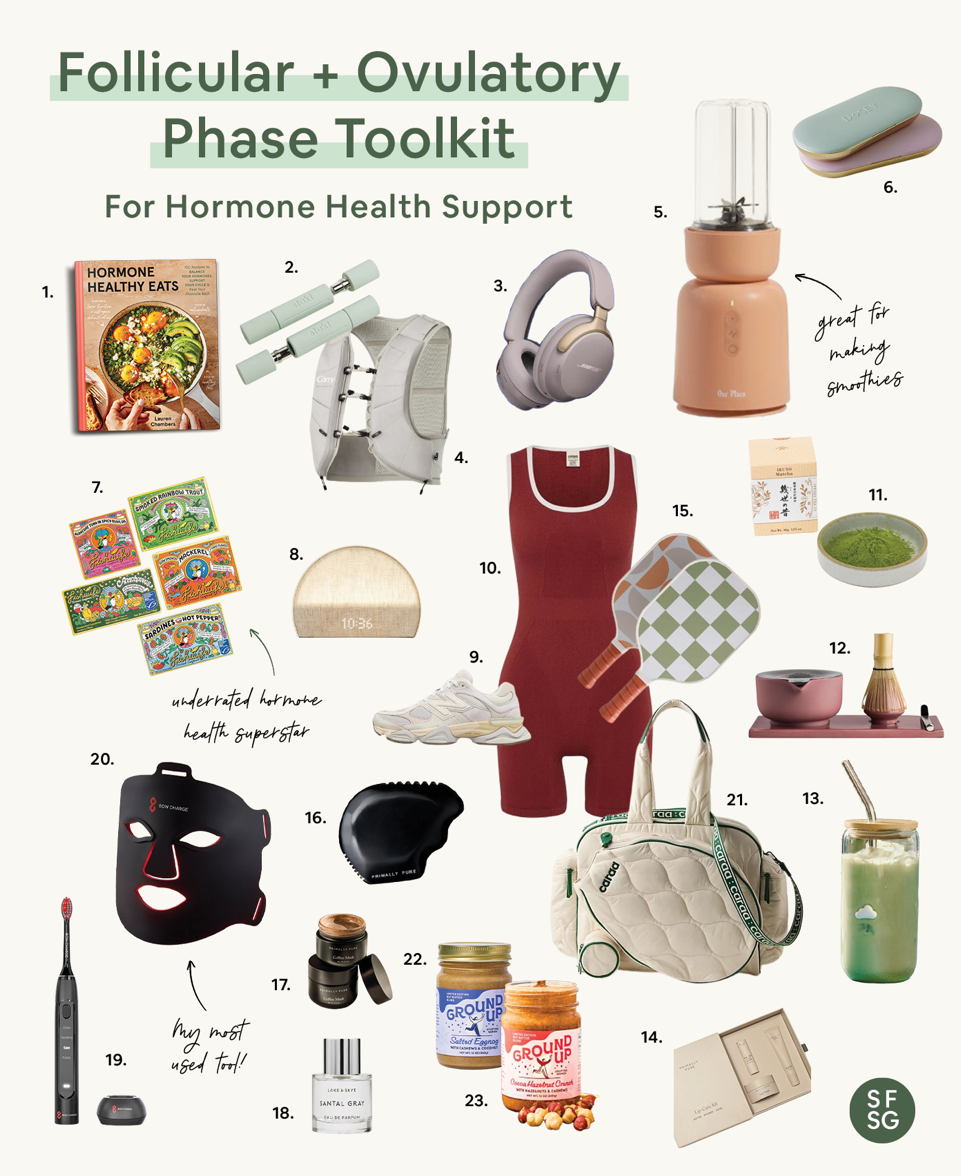recipes
lifestyle
wellness
motherhood
mindset
About
E-Books
Blog
Freebies
partnerships
hi, i'm lauren!
hey there!
I’m on a hot mission to help you balance your hormones & live your best life.
categories
Home
Quiz
Get In Touch
The Course
search:
Cookbook
Recipe key
GF
VG
P
Vegan
Gluten Free
Paleo
DF
Dairy-Free
download now
Join Hormone Healthy Eats!
Become a SFNSG insider to get my monthly Substack, Hormone Healthy Eats! Packed with the latest hormone-healthy recipes
+ tips.
jump to recipe >
WHAT IS PCOS?
PCOS, short for Polycystic Ovarian Syndrome, is a hormonal health condition that affects an estimated 1 in 10 women during their reproductive years.
There are several types of PCOS, each with a multitude of symptoms, however women with this condition tend to have an overproduction of male hormones (called androgens) that lead to the prevention of ovulation, making it the leading cause of infertility among women of childbearing age.
PCOS has also been shown to increase risk of long-term health conditions including insulin resistance, diabetes, heart disease, obesity, infertility, metabolic syndrome, miscarriage, liver inflammation, anxiety, depression and endometrial cancer.
Unfortunately, PCOS can be a complex condition to identify due to the variety of types and symptoms, and most women aren’t properly diagnosed until their 20’s or 30’s (even though many develop it in their teens).
Because these symptoms are so uncomfortable, life-inhibiting and painful (physically and emotionally) I want to create as much awareness as I can around this condition in order to help you effectively treat it and reverse symptoms.
Thus I created a free PCOS Symptoms Quiz (see below) to help you do just that!
PCOS SYMPTOMS QUIZ
Take this free PCOS symptoms quiz to help you determine whether or not you could potentially have PCOS, and if so what to do about it!
COMMON SYMPTOMS OF PCOS
PCOS may present differently in each woman, making it somewhat confusing to diagnose. However, common symptoms of PCOS include:
+ LONG (35+ DAYS) OR IRREGULAR CYCLES THAT RARELY RESULT IN OVULATION
+ MISSING PERIODS
+ MID-CYCLE BLEEDING
+ EXCESSIVE BODY OR FACIAL HAIR (HIRSUTISM)
+ LOSS OF HAIR ON THE HEAD (MALE PATTERN HAIR LOSS)
+ ACNE (PRIMARILY AROUND THE JAWLINE, CHEST AND BACK)
+ WEIGHT GAIN (ESPECIALLY AROUND WAISTLINE) OR INABILITY TO LOSE WEIGHT
+ DIFFICULTY GETTING OR STAYING PREGNANT (MOSTLY DUE TO LACK OF OVULATION)
+ INSULIN RESISTANCE OR DYSREGULATED BLOOD SUGAR
+ ANXIETY OR DEPRESSION
+ OVARIAN CYSTS
+ EXCESS ESTROGEN SYMPTOMS SUCH AS PMS, HEAVY OR PAINFUL PERIODS, FIBROIDS, ETC.
It’s important to note not all women with PCOS have polycystic ovaries, and not all women with polycystic ovaries have PCOS. Healthy women have been found to have polycystic ovaries 25% of the time.
CAUSES OF PCOS
The exact cause (or causes) are unknown, but researchers believe a number of factors may play a role, including:
+ GENETICS (PASSED DOWN GENETICALLY)
+ DYSREGULATED INSULIN OR BLOOD SUGAR
+ ENVIRONMENTAL FACTORS (PROCESSED FOOD, HORMONAL BIRTH CONTROL, TOO MUCH CAFFEINE OR ALCOHOL, CHRONIC INFLAMMATION, EXPOSURE TO TOXINS, ETC.)
TYPES OF PCOS
There are four sub-types of PCOS and knowing which type you have can make all the difference in choosing the most effective treatment protocol (in western medicine, each type of PCOS is managed with the same treatments, even though these treatments only work for some women some of the time.)
The four different sub-types of PCOS are:
+ INSULIN-RESISTANT PCOS
The most common type of PCOS, where high insulin levels interfere with ovulation, causing irregular cycles and other symptoms like weight gain, weight loss resistance, acne, body and facial hair, mood swings, and male pattern hair loss. Women with this kind of PCOS usually have blood sugar and insulin levels that suggest diabetes or pre-diabetes.
+ INFLAMMATION-BASED PCOS
This type of PCOS is most often seen in women who are NOT overweight and don’t present with the classic symptoms of PCOS. Inflammation can be caused by a variety of factors, including food sensitivities, exposure to environmental toxins, gut conditions or digestive disorders, and a nutrient-void diet reliant on sugar, sweeteners, carbs and processed foods.
+ SYNTHETIC HORMONE-INDUCED PCOS
This kind of PCOS is common for women who have been on the pill or other forms of hormonal birth control like the IUD, shot, or ring, for a long period of time. The synthetic hormones shut down communication between the pituitary gland and the ovaries in order to prevent pregnancy, preventing or delaying a period and healthy cycle from returning.
+ ADRENAL PCOS
Most women with PCOS have an elevation of all androgens including testosterone and androstenedione from the ovaries and DHEAS from the adrenal glands, but if you have only elevated DHEAS (but normal testosterone and androstenedione), then you may have adrenal PCOS, which accounts for about 10 percent of PCOS diagnoses. Adrenal PCOS is not driven by insulin resistance or inflammation. Instead, it’s an abnormal response to stress.
***It’s possible to have a combination of these four types of PCOS, or for the root cause of your PCOS to evolve over time.
DIAGNOSING PCOS
Unfortunately, women often develop PCOS in their teens but are not properly diagnosed until their 20’s or 30’s.
A physician can diagnose PCOS based on several factors (called the Rotterdam Criteria). In order for a woman to be diagnosed she must meet two out of the three following criteria:
+ OLIGO-OVULATION
Aka irregular ovulation resulting in anovulatory cycles and irregular periods.
+ HIGH ANDROGEN LEVELS
High readings on a blood test or physical symptoms like acne, excess face and body hair, male pattern hair loss, weight loss resistance and excess weight around the midsection.
+ POLYCYSTIC OR ENLARGED OVARIES
Typically detected via ultrasound, physical exam or pelvic exam. With diagnosing, it’s important to note that PCOS cannot be definitively diagnosed by an ultrasound because it is actually normal for ovaries to have ovarian follicles (cysts). Healthy women can often have multiple ovarian follicles at once, making an ultrasound finding of multiple cysts meaningless on its own when it comes to diagnosing PCOS.
DEBUNKING COMMON PCOS MYTHS
PCOS is still widely misunderstood, and there’s a lot of confusion out there when it comes to effectively diagnosing and treating this condition. Here’s a few myths you might have heard that are important to debunk immediately:
+ SYMPTOMS OF PCOS ARE THE SAME FOR ALL WOMEN
Completely untrue, women can present with a variety of symptoms and characteristics.
+ WOMEN WITH PCOS CAN’T GET PREGNANT
It may be more difficult (due to irregular or lack of ovulation) but women can still get pregnant with their own eggs.
+ BIRTH CONTROL CURES PCOS
The pill is able to mask some symptoms by suppressing your natural hormone production, but it does absolutely nothing to address the underlying causes of PCOS and can worsen the condition/ increase other health risks long-term.
+ METFORMIN CURES PCOS
Metformin works by reducing overall insulin levels, which are often elevated in women with PCOS. That being said, most of the research shows differing and conflicting results, mostly because Metformin is given to women with a PCOS diagnosis regardless of the kind of PCOS they have. Again, insulin-resistant PCOS is very common, but it’s not what every woman has.
+ HAVING YOUR OVARIES OR UTERUS REMOVED CURES PCOS
PCOS presents in so many more ways than just cysts on your ovaries, thus removing reproductive organs does nothing to cure the condition.
+ YOU DON’T NEED TO WORRY ABOUT PCOS IF YOU’RE NOT TRYING TO GET PREGNANT
Because the condition affects so many aspects of your general health, its impact on fertility is not the only concern, making it important to treat either way.
FERTILITY AND PCOS
As mentioned above, it is a complete myth that you cannot get pregnant with PCOS. While PCOS does make it more difficult to conceive (primarily by delaying or preventing ovulation, a necessary component of fertility) you can naturally treat and even reverse symptoms through nutrition and lifestyle changes. I know firsthand plenty of clients and women who have successfully conceived and birthed healthy babies with PCOS, and I want to empower you with tools to help you do so as well!
IF YOU NEED MORE NUTRITION + LIFESTYLE TIPS, RECIPES, AND SUPPORT ON YOUR JOURNEY TO GETTING PREGNANT WITH PCOS, CHECK OUT THIS GUIDE.
MORE PCOS RESOURCES
+ Your Guide To Balancing PCOS Hormones Naturally
+ The BEST PCOS-Friendly Foods + Recipes
+ 28-Day Hormone Balance Reset Plan

If you loved that...

01.

02.

03.

04.

05.
hey!
Keep Browsing
Site
Keep Browsing
Site
the
about
e-books
blog
downloads
quiz
Welcome friend, I'm lauren.
I’m honored to support you on your journey to optimal hormone health + happiness. Thanks for being here babe.


